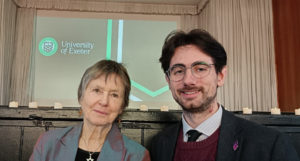French literature expert earns international plaudits for new book

A recently-published book that explores the figure of the female intellectual has been commended by an international prize recognising the best scholarly publications on women and gender.
Women Writing Antiquity: Gender and Learning in Early Modern France – by Dr Helena Taylor – was named joint runner-up in the Society for the Study of Early Modern Women and Gender book prize, receiving a co-honourable mention.
The prize was awarded for the best scholarly monograph on women and gender in the early modern period (1450-1750), published or completed between June 2021 and May 2024.
Dr Taylor, Associate Professor of French and Comparative Literature, researched the book over several years, including during her Leverhulme Early Career Fellowship from 2018 onwards. It was published by Oxford University Press in April of this year.
“I was absolutely delighted and amazed to be named as joint runner-up and awarded a co-honourable mention,” said Dr Taylor, of the Department of Languages, Cultures and Visual Studies. “The prize covers a large number of disciplines including history, literature and philosophy, as well as all regions and countries. It’s wonderful to think that, in this case at least, my work spoke across those disciplines and beyond French Studies.”
In the book, Dr Taylor approaches the subject of the female intellectual by focusing on women’s own representations of that figure in seventeenth-century France. In so doing, she examines in detail the work of 11 diverse authors, ranging from translators to poets; playwrights to fairy tale writers, including Marie de Gournay, Madeleine de Scudéry and Madame de Villedieu.
“I wanted to examine how women presented themselves as intellectuals in a period when they did not have formal access to education,” she said. “My argument in this book is that the struggle to define the female intellectual in this period lay at the centre of a broader struggle over the definition of literature and literary knowledge during a time of significant cultural change.
“As the female intellectual became a figure of debate, France was also undergoing a shift away from the dominance of classical cultural models, the transition towards a standardized modern language, the development of a national literature and literary canon, and the emergence of the literary field. This book explores the intersection of these phenomena, analysing how a range of women constructed the female intellectual through their reception of Greco-Roman culture.
Dr Taylor is currently principal investigator on the five-year ‘Cultures of Philosophy: Women Writing Knowledge in Early Modern Europe‘ project. Funded by UKRI, it focuses on the seventeenth century, and the sub-discipline of natural philosophy, and takes a transnational approach to women’s knowledge production with case studies from France, England, the Dutch Republic and Italy.
To read more about her work, visit her profile on the website.



